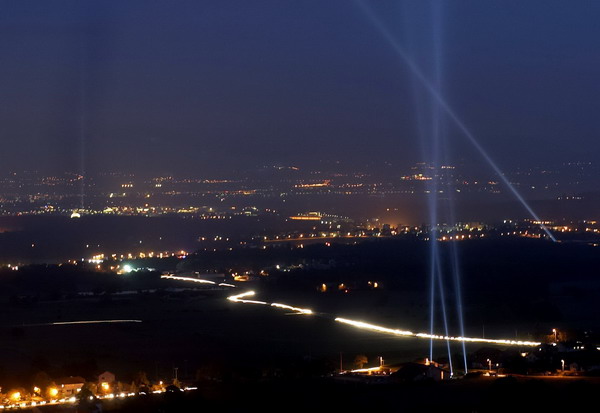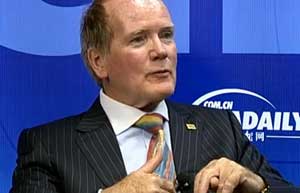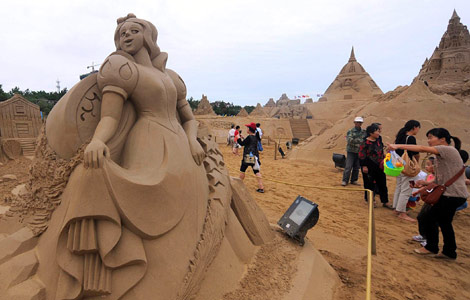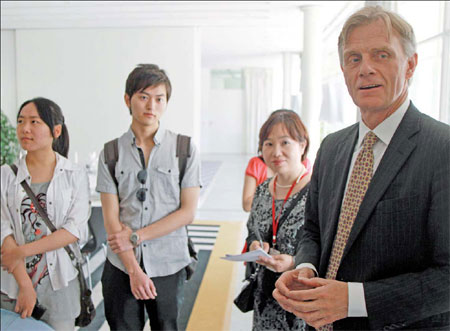Nobel laureates doubt superluminal neutrino experiment
Updated: 2011-09-27 06:53
(Xinhua)
|
|||||||||
|
 File photo of spotlights aimed at the sky above ground along the 27 km (16.7 miles) path of the underground ring of the LHC (Large Hadron Collider) of the CERN (Centre Europeen de Recherche Nucleaire) in Geneva September 29, 2004, to celebrate CERN's 50th anniversary. [Photo/Agencies]
|
They made the remarks in Beijing prior to a forum for Nobel laureates.
"I'm willing to bet money that it's not correct," said Professor George Smoot III, winner of the 2006 Nobel Prize in Physics and a professor at University of California, Berkeley, referring to an experiment result claiming that particles apparently travel faster than light.
The experiment reported an anomaly in the flight time of neutrinos, or electrically neutral subatomic particles, from the European Center for Nuclear Research (CERN) in Switzerland to a laboratory located 730 kilometers away in Italy.
Particles were clocked transmitting at a speed of 300,006 kilometers per second, about 60 nanoseconds faster than the speed of light.
Smoot said that the claims "did not make sense" and should be verified by other scientists first.
"There are many distortions in physics. You have to have a very high standard to see if something is truly correct," he said.
The unverified findings were published on September 22 in the scientific journal Nature. European researchers working in a team called OPERA (Oscillation Project with Emulsion-Racking Apparatus) projected masses of neutrinos from CERN and then collected the particles using a massive detector in Gran Sasso, south of Rome.
Other scientists, as well as the OPERA team themselves, have voiced doubts regarding the experiment's results.
The findings, CERN claims, could pose far-reaching potential consequences once verified.
If correct, the results would bring Einstein's theory of special relativity into question. Under this theory, a physical object cannot travel faster than the speed of light in a vacuum.
"If really it is right, we have to rethink everything we know," said Chris Llewellyn Smith, former director of CERN.
Smith claimed the unprecedented discovery was too exceptional to find proof.
"If somebody makes a very exceptional claim, then very exceptional proof would need to come from another experiment, saying the same thing. But we don't have the other thing," Smith said.
Carlos Rubbia, a Nobel Laureate who won the prize for physics in 1984, is in charge of a team of more than 100 scientists at CERN.
"What it is pretending to find, in my view, is unbelievably surprising," Rubbia said.
"Frankly, I have the feeling that this is still a very experimental consideration," Rubbia said.
He also believes that revealing the findings to the public was a mistake as it remained an experimental process and no conclusion could be drawn without the results of another experiment.
Despite the possibility of verification, Einstein's special theory of relativity will remain valid.
"I will be very, very surprised that, at last, Einstein will not be the winner," Rubbia said.
To achieve a breakthrough, Rubbia has urged for more joint cooperation on verifying the test results. International cooperation on this issue "is a must."
"It requires coordination from all nations," said Rubbia.
The 2011 Nobel Laureates Beijing Forum will be held from September 28 to 30 under a theme of "innovation and development."










